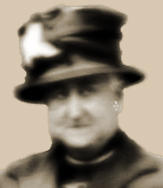Hacked Off
Lady Bracknell is painfully aware that she will be preaching to the converted, and that it is highly unlikely that her words will deflect even one of the perpetrators from his or her habitual path. Nevertheless, she is so affronted by the editor's account of recent events that she can not let the issue go unremarked. The story is as follows:
Yesterday, the editor received an email from said journalist in which he congratulated her on the "sterling work" which had led to her being awarded an MBE, and offered to interview her for the paper. (Quite how he could have known that the editor's work had been of a "sterling" character when he does not know her from Adam is a matter for greater intellects than that possessed by either Lady Bracknell or her editor to ponder.)
The editor - less than wholly enthralled, in any event, by the prospect of appearing in the paper in question - responded that she had grave concerns about the way in which disability stories are generally presented in its pages, and was not prepared to have the better part of nine years' disability equality work marred by any suggestion that she had "overcome" her own impairments in so courageous a way that her managers - inspired by her plucky attitude to her sufferings - felt that she should be publicly rewarded for her courage in the face of adversity. Or some such medical model nonsense. She cited a recent article about a colleague who has been very successful in the Blind Sailing Championships which began with the immortal phrase, "Despite being blind...". She said that she would only consent to be interviewed if she had editorial control over the disability-related terminology used in the article.
Several exchanges of emails later, the journalist has withdrawn his offer of an interview. He has also made a rather puzzling statement to the effect that a diverse publication cannot be achieved if the subjects of its articles are permitted to have control over the way in which their minority status is presented. The editor has concluded - not, Lady Bracknell thinks, without reason - that he is a hopeless case, and has spent the day basking in the praise of like-minded individuals who have applauded her for refusing to compromise her principles.
It is a truth universally acknowledged amongst disabled persons who campaign for equal rights that their cause is greatly hindered by journalists and broadcasters who seem unequal to the task of portraying them simply as people, and who can never resist the temptation to describe them as either tragic or amazing/brave. Neither do they seem capable of understanding the simple and demonstrable fact that the terminology they use has a direct impact on their readers' perceptions about all disabled persons.
If one's opening sentence begins with the words, "Despite being blind...", one is perpetuating the assumptions that
- blindess is inherently tragic
- blind persons can not be expected to accomplish even simple tasks without assistance; and
- should a blind person accomplish anything that a sighted person would not expect them to be able to, that fact is newsworthy in and of itself.
None of these is true.
Should a disabled person do something which is newsworthy - and, although many live lives of equivalent tedium to those of their non-disabled neighbours, others do not - it is surely not beyond the wit of man to report on what has been accomplished without recourse to writing in a way which encourages the reader to feel either sympathy or admiration purely in response to the fact that the subject of the article has an impairment.
Articles composed about persons from other minority groups do not begin with the words, "Despite being black/Muslim/gay/only a feeble woman....". Lady Bracknell ventures to suggest that there would be an immediate uproar if they did. And yet, if the editor's recent correspondence is to be taken as indicative, the average journalist cannot understand how writing in that way about a disabled person could be deemed to be insulting and offensive by their subject.
Should there be any among her UK readers who share Lady Bracknell's views on this issue, they could do worse than to familiarise themselves with the existence of the Hacked Off leaflet, and wave it in a peremptory fashion under the noses of any editors who permit articles in this vein to be published.











7 Comments:
As The Edotor knows i wrote a letter of complaint to the said journal about the use of language in the article. I didn't receive acknowledgement.
I fully support your stance over this. Good one.
Ahh yes. Journalists are never, or rather VERY rarely, going to let you see their work before it's published. As far as they are concerned they are the journalists and they're right in that they will know better than you what works in their paper and what the readership wants to read.
Sadly, in many cases, it is widely felt taht readers want to read more 'despite ...' stories. Don't forget, journalists don't have a political angle on their stories, you were probably the feelgood fluff for that publication and it looked like you weren't going to let him paint you in that way ... or rather he just may have fallen out of love with the story because you weren't the cute crip he wanted.
So, in a nutshell, I'd suggest just saying no full stop to that kind of coverage. It's almost always unhelpful to you as someone who wants to be taken seriously and also to the disabled readership who will a) just groan at you and b) think they'll just hav to tighten their belt and move on 'despite the journalism'.
Not helpful am I.
I feel that the journalist in question is to be congratulaated on being able to find employment despite having a total charisma bypass. He is obviously very, very brave and such an inspiration to others.
MB,
And I note your letter wasn't published in the current issue, either.
The Editor
Damon,
On the contrary, that was very helpful: you've confirmed that my initial instinct to avoid being interviewed like the plague was a sound one.
Of course, what this journo doesn't know is that there will be an article about me in the Union magazine and it's already been confirmed that I will get to write that one myself.
I'm looking forward to drawing his attention to it when it's published...
The Editor
Dame Honoria,
Thank you: you always make me laugh.
The Editor
Charles,
Welcome, and thank you.
The Editor
Post a Comment
<< Home